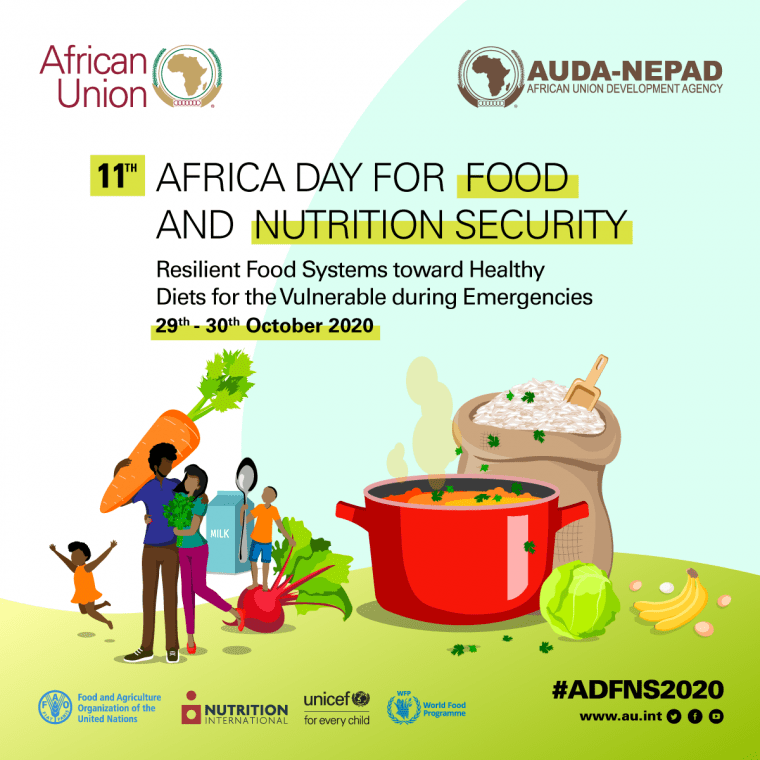29-30 October 2020. 11TH AFRICAN DAY FOR FOOD AND NUTRITION SECURITY
The African Union Department of Rural Economy and Agriculture (DREA), the African Union Development Agency (AUDA-NEPAD) and partners have been collaborating to organise the commemoration of the 11th Africa Day for Food and Nutrition Security (ADFNS) via video link on 30th October 2020.
The Africa Day for Food and Nutrition Security (ADFNS) was declared in July 2010 by the African Union Heads of State and Government at the 15th Ordinary Session of the AU Summit in Kampala, Uganda tugged as Decision “Assembly/AU/Dec.327(XV)”. This decision was made in the wake of unacceptably persistent food insecurity epitomized by chronic malnutrition on the continent. A side event convened in the margins of this Summit under the banner “Africa must feed itself. No child should go to bed hungry”, came out with a bold recommendation for setting aside a day that sets light on the centrality of food and nutrition security in Africa’s development agenda.
The ADFNS has so far been successfully commemorated ten times following its launch in Lilongwe, Malawi, on 31st October 2010. Successive editions of the Day were hosted by Ethiopia, AU Headquarters, Niger, Democratic Republic of Congo, Uganda, Ghana, Côte d’Ivoire, Tanzania and Egypt.
Purpose and Objectives
Sub-theme 1: Building and sustaining resilient food systems in Africa (led by FARA)
Panel 1: Foresight for strengthening resilience of Africa’s Food SystemPanel 2: Deployment of science, technology and Innovation to mitigate impact of COVID-19 on
The ADFNS has so far been successfully commemorated ten times following its launch in Lilongwe, Malawi, on 31st October 2010. Successive editions of the Day were hosted by Ethiopia, AU Headquarters, Niger, Democratic Republic of Congo, Uganda, Ghana, Côte d’Ivoire, Tanzania and Egypt.
Purpose and Objectives
- The main aim of commemorating the 2020 ADFNS is to motivate an appreciation of the underlying benefits and potential that investment in resilient food systems can create. It is also hoped that the event will generate a momentum toward implementation of continental, regional and national food and nutrition policy and, in particular, to:
- To act as a one-stop shop for sharing experiences, lessons and motivating commitments and action toward investing in and sustaining the different food systems so that they create optimum impact on food and nutrition security across the continent and then achievements of the Malabo 2025 ending hunger by 2025 goal and MDG 2.
- To raise awareness and generate an appreciation of the short and long term benefits of making food systems to become resilient in the face of emerging and recurrent emergencies riddling the continent.
- To act as a platform for exploring, recommending and advocating for practical toward mitigating and preventing malnutrition in emergencies
- To stimulate action by all key stakeholders toward investing in application of science in agricultural, livestock and aquaculture production that lead to improved nutrition and health outcomes.
- To produce strategic directions for improving capacities (technical, institutional, managerial and financial) for delivering on food systems-based initiatives.
- To raise the awareness of available opportunities of harnessing science in agriculture for improved livelihoods of refugees and IDPs.
This ceremonial event was preceded by 180-minute Technical Dialogue on 29th October 2020, which was informed by the theme: “Resilient Food Systems toward Healthy Diets for the Vulnerable during Emergencies: Lessons from the Covid-19 Pandemic”
Panel 1: Foresight for strengthening resilience of Africa’s Food System
- Mr. Martin Bwalya, AUDA-NEPAD
- Mr. Jim Woodhill, Board
- Member, Foresight4Food
- Julius Gatune, DeKUT
- Dr. Abdulrazak Ibrahim, FARA
Africa’s food system
- Abdulai Jalloh, CORAF
- Hambani Masheleni , AUC-HRST
- Dr. Bing Zhao, Food Systems
- Coordinator, WFP
- Dr. Rose Omari, CSIR-Ghana
- Christoph Larose, EC
Sub-theme 2: Scaling-up toward mitigating and preventing chronic malnutrition during and after the Covid-19 Pandemic (led by UNICEF)
Setting the scene
- Effect of COVID on malnutrition in Africa and emerging lessons on building and scaling up resilient food systems in COVID including gender dimensions Ms. Chriatiane Rudert, UNICEF Eastern and Southern Africa Regional Nutrition Adviser
- Continental framework for nutrition response Ms. Bibi Giyose, Head of Nutrition, AUDA-NEPAD
Experience
sharing on: building
resilience
food and
nutrition
systems.
- Building resilient food systems including use appropriate technology - Ms. Joyce Maru, Program Coordinator, Sweet Potato Program International Potato Center (CIP)
- Scaling up essential nutrition actions including health and WASH - Dr Felix Phiri, Director Nutrition, HIV and AIDS, Department of Nutrition, HIV and AIDS, Malawi Ministry of Health
- Social protection systems and interventions - Ms. Magdalena MOSHI, WFP
- Dr. Namukolo Covic, Senior Research Coordinator, A4NH
- Dr Jacqueline Kungú,
- Dr Victor Owino,
- Prof Waliou Amousa Hounkpatin
Sub-theme 4: Promoting traditional and indigenous knowledge to enrich Africa’s diets and food systems (Co-led by AUDA-NEPAD and FAO-Regional Office for Africa)
Panel 1
The State of FNS in the World –
The Role of Indigenous Foods in
eliminating hunger and all forms
of malnutrition
- Mphumuzi Sukati,Senior Nutrition Officer, FAORAF 15:25-15:35 3.
Panel 2
Continental perspective on the
use of indigenous foods
- Kefilwe Rhoba Moalosi, Project Manager – Nutrition, AUDA/NEPAD


No comments:
Post a Comment